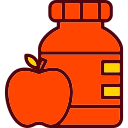
Essential Nutrients in Athlete Meal Planning: Fuel With Purpose
Chosen theme: Essential Nutrients in Athlete Meal Planning. Welcome! Here we translate sports nutrition science into flavorful, everyday meals so you can train harder, recover faster, and feel sharper. Dive in, ask questions, and subscribe for weekly athlete-focused nutrition inspiration tailored to real life.
Macronutrients That Power Performance
Protein: Building Blocks for Muscles and More
Aim for high-quality protein across the day to support repair, immune health, and enzyme function. Many athletes thrive near 1.6–2.2 g per kilogram of body weight, with each meal hitting a leucine-rich dose. Share your go-to protein sources and tell us what helps you recover best.
Carbohydrates: Fuel for Training and Speed
Carbs replenish glycogen and protect intensity during intervals and long sessions. Mix slow-digesting grains for daily energy with quicker carbs around workouts. Experiment with portion sizes on hard days, then comment with your favorite pre-workout carb combo and how it changed your sessions.
Fats: Hormones, Endurance, and Satiety
Healthy fats stabilize energy, support hormones, and aid absorption of fat-soluble vitamins. Emphasize olives, nuts, seeds, avocado, and oily fish while moderating saturated fats. What snacks keep you satisfied without slowing training? Post your favorite fat-smart bites for teammates to try.

Micronutrient MVPs for Strong Training Blocks
Iron: Oxygen’s Co-Pilot
Low iron can quietly drain power and mood. Heme iron from lean meats is highly bioavailable, while plant iron absorbs better with vitamin C. One runner boosted ferritin by pairing lentils with citrus, restoring tempo pace. How do you support iron? Share tips for plant-forward days.
Calcium and Vitamin D: Bones That Hold the Load
High-impact training requires resilient bones. Choose dairy, fortified plant milks, tofu, and greens for calcium, and check vitamin D status seasonally. An indoor cyclist reduced stress reactions after targeting both. Tell us your favorite calcium-rich meal that actually fits busy training.
B12, Zinc, and Magnesium: Quiet Engines of Resilience
B12 supports nerves and red blood cells, zinc fortifies immunity, and magnesium assists muscle relaxation and glucose control. Vegans should monitor B12 closely. Try beans, seeds, and whole grains, then note sleep or cramp changes. Comment if magnesium timing improved your nighttime recovery.
Hydration and Electrolytes Without the Guesswork
Sodium: The Sweaty Truth
Sweat rates vary widely. Weigh before and after training to estimate losses, then tailor sodium intake to conditions. Many athletes benefit from 300–800 mg sodium per liter. Post your sweat test results and what mix kept your head clear on the hottest, hardest sessions.
Potassium and Magnesium: Muscle Rhythm Keepers
Potassium supports fluid balance and nerve function; magnesium helps regulate muscle contraction and energy metabolism. Bananas, potatoes, beans, and nuts effortlessly boost both. Not a cure-all for cramps, but a smart base. What whole-food electrolyte combos fit your workouts? Share your quick fixes.
A Practical Hydration Plan You’ll Actually Use
Pre-hydrate slowly, sip during long workouts, and rehydrate with electrolytes afterward. A cyclist built a routine: bottle per hour, then an extra salty drink post-ride—headaches vanished. Try a similar approach this week and report back with your tweaks and favorite bottle flavor.
Timing and Periodization: Nutrients When They Matter Most
Before You Train: Smooth Energy, Calm Stomach
Eat a balanced meal two to three hours pre-workout, or a small low-fiber snack 30–60 minutes before if time is tight. Favor easy carbs and modest protein. What pre-run or pre-lift snack hits the sweet spot for you? Share and help others troubleshoot nerves or nausea.
During Workouts: Carbs for the Long Haul
For sessions over 60–90 minutes, most athletes benefit from 30–90 grams of carbs per hour. Dual-source blends of glucose and fructose raise ceilings. Practice your fueling in training, never on race day. Tell us which gels or real-food bites your gut actually tolerates.
After Training: Repair, Refill, Rebuild
Target 20–40 grams protein and 0.8–1.2 g/kg carbohydrate to kick-start repair and glycogen restoration. A chocolate milk or yogurt-bowl works in a pinch. Notice reduced soreness after consistent post-workout meals? Drop your simplest recovery combo to inspire someone’s next session.

Gut Health and Better Nutrient Absorption
Enjoy high-fiber foods on rest days to feed your microbiome, but taper fiber before races and intense sessions to reduce GI distress. Oats, berries, and beans have their place; timing is the trick. What pre-race low-fiber meals work for you? Add your favorites.

From Plan to Plate: Practical Athlete Meal Templates
Try oatmeal topped with berries, peanut butter, and chia, plus Greek yogurt on the side. You get complex carbs, fiber for off-days, omega-3s, and 25–35 grams of protein. What breakfast keeps you energized without a crash? Drop your favorite build and why it works.

